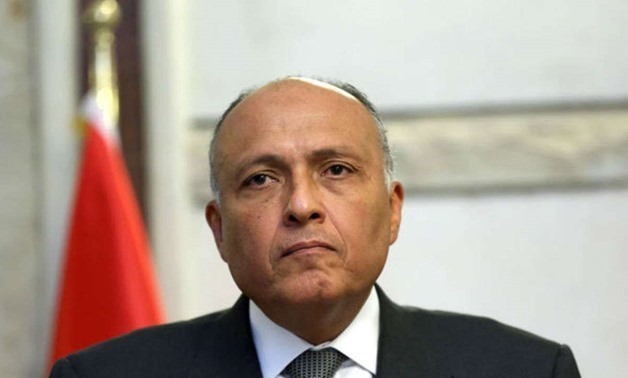
FILE – Egyptian Foreign Minister Sameh Shoukry – Reuters
CAIRO – 10 October 2019: Foreign Minister Sameh Shoukry said Ethiopia’s insistence to fill and operate the Renaissance Dam without reaching an agreement with Egypt and Sudan “is unacceptable, and a clear violation of the Declaration of Principles Agreement,which might negatively affect the region’s stability.”
In his speech at the Parliament’s plenary session, Shoukry urged the international community to shoulder the responsibility of reaching a fair agreement regarding the Renaissance Dam, and to activate Article 10 of the Declaration of Principles Agreement that allows parties to integrate mediation in case negotiations fail to solve the dispute.
Shoukry referred to Egypt’s previous demand for the World Bank’s mediation, and its adoption of a scientific approach when addressing the issue rather than the fait accompli policy, which confirms “Egypt’s goodwill towards reaching a fair agreement.”
The foreign minister continued that Egypt is always seeking to establish brotherly and cooperative relations based on mutual respect among the peoples of the three countries to create brighter present and future and to reach a fair deal regarding the Renaissance Dam.
“Egypt is open to dialogue and communication, and is aware of its responsibilities and duties towards its people and their water rights,” Shoukry said, adding that Egypt will devote all its political tools not only to protect its interests but also to implement the international law.
Shoukry further pointed the importance of Sudan’s cooperation with Egypt in this vital cause in light of the unity of both countries' destinies, and the 1959 agreement signed between both countries on common water interests that must be preserved to protect the peoples’ rights.
“The Renaissance Dam issue has reached a very delicate and sensitive stage after long negotiations without reaching an agreement that respects the rights of the three countries,” Shoukry reiterated.
The session was attended by Prime Minister Mostafa Madbouly who said that Egypt has entered the water poverty phase, according to the international definition of the term, under which the individual’s share of water is below 1,000 cubic meter/year.
“Today, our River Nile resources account to 55.5 billion cubic meters, while the figure rises to 10 billion cubic meters or a little more if other resources including rain water, ground water and desalinated water are included,”Madbouly clarified, adding that an individual’s share of water in Egypt nowadays is 700 cubic meters/year, with the figure declining with the increase in population.
The premiere affirmed that Egypt is taking all the necessary measures to develop water resources, and aims to reduce the needs of each individual of water taking into consideration the rising population.
On October 5, Ministry of Irrigation said that the Ethiopian position has brought the negotiations to a standstill, especially after Ethiopia rejected the Egyptian integrated proposal for the rules of filling and operating the Renaissance Dam, which is fair and balanced and takes into account the interests of the three countries.
During a round of negotiations in Khartoum at the level of the independent scientific research group, and during the ministerial meeting that followed from September 30 to October 5, 2019,Ethiopia refused to discuss the rules of operation of the Renaissance Dam and insisted on limiting the negotiation to the filling phase and the rules of operation during the filling phase.
This contradicts with Article 5 of the text of the Declaration of Principles Agreement signed on March 23, 2015, and with the international norms for cooperation in the construction and management of dams on shared rivers.

Comments
Leave a Comment